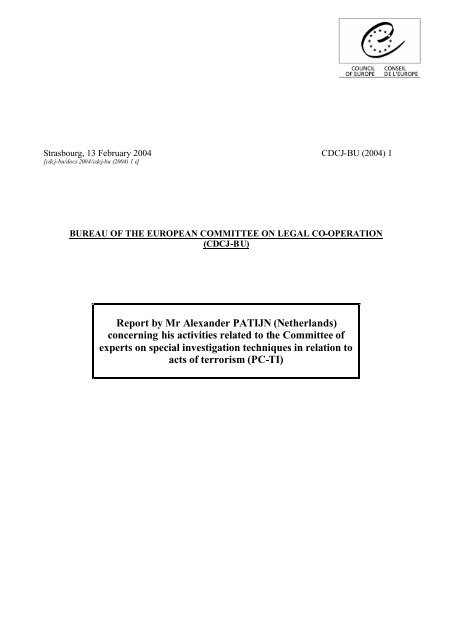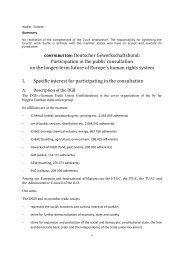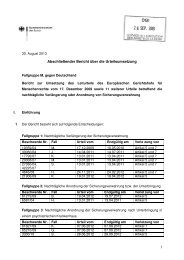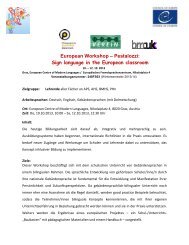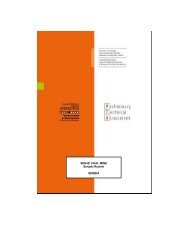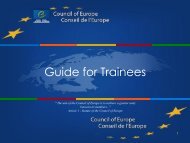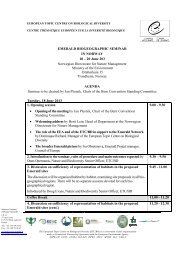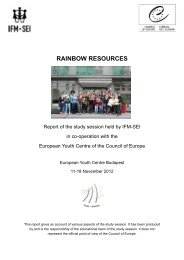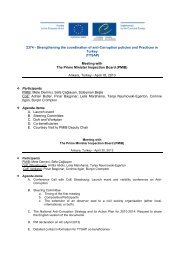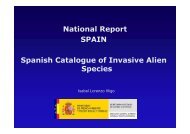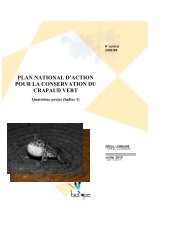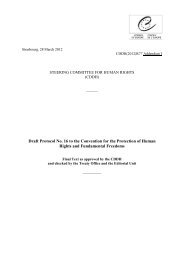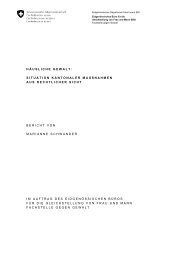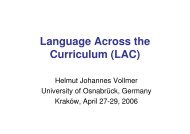Report by Mr Alexander PATIJN (Netherlands) concerning his ...
Report by Mr Alexander PATIJN (Netherlands) concerning his ...
Report by Mr Alexander PATIJN (Netherlands) concerning his ...
You also want an ePaper? Increase the reach of your titles
YUMPU automatically turns print PDFs into web optimized ePapers that Google loves.
Strasbourg, 13 February 2004 CDCJ-BU (2004) 1<br />
[cdcj-bu/docs 2004/cdcj-bu (2004) 1 e]<br />
BUREAU OF THE EUROPEAN COMMITTEE ON LEGAL CO-OPERATION<br />
(CDCJ-BU)<br />
<strong>Report</strong> <strong>by</strong> <strong>Mr</strong> <strong>Alexander</strong> <strong>PATIJN</strong> (<strong>Netherlands</strong>)<br />
<strong>concerning</strong> <strong>his</strong> activities related to the Committee of<br />
experts on special investigation techniques in relation to<br />
acts of terrorism (PC-TI)
- 2 -<br />
At its 78 th Plenary meeting (20-23 May 2003) the CDCJ appointed <strong>Mr</strong> <strong>PATIJN</strong> (<strong>Netherlands</strong> -<br />
Chair of the Project Group on data protection (CJ-PD)) to represent it on the Committee of experts<br />
on special investigation techniques in relation to acts of terrorism (PC-TI).<br />
1. The CDCJ has appointed <strong>Alexander</strong> <strong>PATIJN</strong>, at that time President of the CJ-PD, as its<br />
representative in the ad hoc Committee of experts on special investigation techniques in<br />
relation to acts or terrorism (PC-TI). The PC-TI built upon the work that had already been<br />
done <strong>by</strong> the Multidisciplinary Group on International Action Against Terrorism (GMT). The<br />
work of the PC-TI has resulted in a final report of 6 October 2003 (PC-TI (2003) 11 rev). The<br />
report gives an inventory of the relevant case law of the ECHR with regard to the use of<br />
special investigation techniques. Generally spoken these are techniques for gathering<br />
information systematically in such a way as not to alert the target person(s), applied <strong>by</strong> law<br />
enforcement officials for the purpose of detecting and investigating crimes and suspects. It<br />
concludes that it would be feasible to draw up a recommendation and to further develop<br />
common principles among the member States in the use of special investigation techniques.<br />
2. T<strong>his</strong> present report highlights some elements that might be of special importance to the CDCJ.<br />
<strong>Mr</strong> Patijn presented 6 August 2003 some written remarks on a draft final report in a document,<br />
made available 19 September 2003 as PC-TI (2003) Misc 3. These remarks led to the<br />
mentioning of some elements in the final report. The concrete contributions might be<br />
mentioned hereafter.<br />
3. The systematic recording of personal data is mentioned as a special investigation technique<br />
(§ 86). A reference is made to the work done <strong>by</strong> the CJ-PD (enumerated in footnote 19).<br />
Elements reoccur in other paragraphs, like in § 49 about the principle of specificity. It could<br />
be seen as remarkable that from a data protection point of view a less restrictive approach<br />
could be advocated than the PC-TI originally was inclined to. It was possible to specify the<br />
originally proposed general statement personal data collected for the prevention or<br />
investigation of a specific terrorist crime or aimed against a specific terrorist group, could in<br />
principle only be used subsequently against that specific crime or group. T<strong>his</strong> is true for the<br />
investigation of individual criminal offences, but not for analysis files. Analysis files are files<br />
set up to gather inelligence about a specific phenomenon of crime without yet targeting an<br />
individual criminal offence. The Third Evaluation of the Recommendation R (87) 15<br />
regulating the use of personal data in the police sector, has made apparent that a distinction<br />
should be made between both sorts of files.<br />
4. On the one hand analysis files, in general set up for proactive purposes, are comparable with<br />
state security files to the extent that the criteria of Rotaru-judgment of 4 May 2000 of the<br />
ECHR are applicable. T<strong>his</strong> means that the categories of persons about whom data are recorded<br />
and the categories of those data should be defined beforehand. At random collection of<br />
personal data is excluded. Given these restrictions a matching of different analysis files in<br />
order to possibly find new relevant information is deemed to be allowed. On the other hand<br />
such restrictions to specific categories of persons and data are not possible with regard to<br />
investigation files of specific criminal offences. The principle of fair trial as meant in article 6<br />
ECHR implies that in a prosecution all relevant information should be presented to the court,<br />
also exculpatory evidence. For t<strong>his</strong> purpose there can be no limitation beforehand of the group<br />
of persons or the data about them, that may be recorded. The limitation in the personal data to<br />
be collected is given <strong>by</strong> the investigated offence. Only in t<strong>his</strong> sort of files the principle of<br />
specificity entails that the data cannot be used to possibly find new relevant information <strong>by</strong><br />
matching with other unrelated cases, unless there is concrete link. Taken together, both the
- 3 -<br />
rules for analysis files and for files for the investigation of individual criminal offences,<br />
exclude the possibility of fishing expeditions (cf. § 50 of the PC-TI report).<br />
5. It appeared also to be useful with regard to the application of the specificity principle to make<br />
a distinction between police and judicial data in case of transfer to other countries (§ 101). The<br />
international exchange of police data is less restricted than the exchange of judicial data. The<br />
background is that the police has to find the evidence and sometimes needs therefore to go<br />
through a vast amount of data. It is not always evident beforehand that some available data<br />
might be useful for such investigations. Once the judiciary receives data, the evidence is in<br />
general available. In principle its use can therefore be limited to the individual case.<br />
6. A final remark that has found its place in the report is about alleged transborder effects of<br />
special investigation techniques (§ 59). Article 13 ECHR requires an effective remedy in case<br />
somebody has reason to believe that the application of such a technique has affected one of<br />
the rights or freedoms set forth in the ECHR. As the techniques in question <strong>by</strong> their nature are<br />
surreptious and therefore not known to the person against whom they are directed, t<strong>his</strong> article<br />
gains special importance (cf. Klass-case of ECHR of 6 September 1978). Modern techniques<br />
make it possible to gather intelligence about criminal activities abroad without entering<br />
foreign territory. The initiative to apply an investigative technique can be taken in one country<br />
and its application may affect the rights and freedoms of somebody abroad (e.g. interception<br />
of telecommunications). T<strong>his</strong> presses even more when law enforcement officials for the<br />
execution of an investigative technique have entered foreign territory whether legally or<br />
illegally. International cooperation should not be limited to detect criminals but should extend<br />
to the protection of citizens that might be unjustly affected <strong>by</strong> investigation techniques too.<br />
Countries should therefore allow on a non-discriminatory basis non-nationals and residents<br />
from abroad access to their control bodies that constitute an effective remedy in the sense of<br />
article 13 ECHR. 31 December 2003.<br />
OoO


